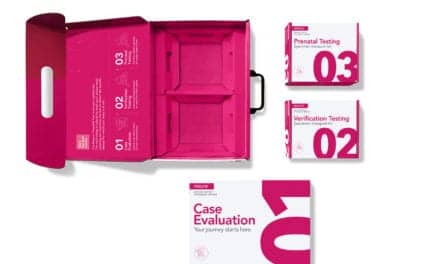Thermo Fisher Scientific, San Jose, Calif, and NX Prenatal Inc, Louisville, Ky, are collaborating to develop clinical mass spectrometry-based proteomic assays to monitor fetal health in utero and assess the risk of adverse outcomes, including preterm birth and preeclampsia.
The collaboration recognizes the challenges faced by medical professionals, who have few tools available for noninvasive risk stratification for adverse pregnancy outcomes. By combining NX Prenatal’s NeXosome platform with Thermo Fisher’s liquid chromatography–mass spectrometry (LC-MS) instrumentation, the workflows can address the reliability, accuracy, and precision of the analytical solutions currently available to clinical scientists.
“Our collaboration with NX Prenatal is aiming to enable us to better evaluate maternal and fetal biomarkers during pregnancy that correlate with adverse outcomes, such as preterm birth,” says Brad Hart, senior director for clinical research, chromatography, and mass spectrometry at Thermo Fisher Scientific. “The codevelopment of a commercially available clinical mass spectrometry-based proteomic assay has the potential to provide a diagnostic solution to both clinical scientists and medical professionals, offering more confidence in the evaluation of novel biomarkers that can support a safe delivery and healthy future for mother and baby.”
“At NX Prenatal, we are developing novel assays and noninvasive early warning systems to detect subtle molecular changes in the maternal-fetal environment, all with the goal of improving the rate of healthy pregnancy outcomes,” says Brian D. Brohman, CEO of NX Prenatal. “Our collaboration with Thermo Fisher Scientific brings together our novel NeXosome platform with their leading analytical technology, with the goal of optimizing clinical mass spectrometry-based workflows in an effort to provide the precision necessary for personalized diagnostic solutions to improve health outcomes for both mother and child.”
The unique NeXosome technology is used to enrich maternal blood samples for microparticles, such as exosomes, which play key roles in maintaining certain balances between the mother and fetus during pregnancy. Aberrations in these balances have been shown to correlate with the likelihood of adverse pregnancy outcomes. Merging the NeXosome platform with Thermo Fisher LC-MS technology has the potential to generate fast, efficient, and accurate data for the analysis of exosome-derived proteomic biomarkers, which may lead to increased information about maternal and fetal health during pregnancy. Ultimately, the analysis has the potential to support obstetrical care decisions in conjunction with traditional clinical assessments.
For further information, visit Thermo Fisher Scientific.
Featured image: Neonate image courtesy NX Prenatal.






